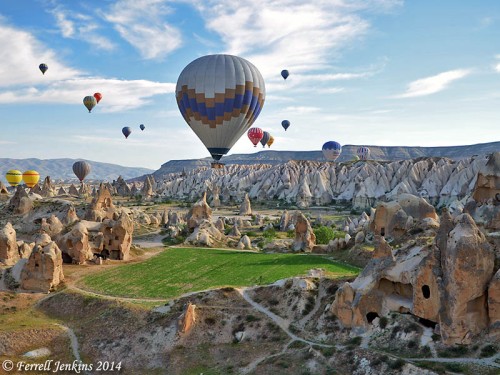“Turkey? Why would you want to go to Turkey?” That is a question I have been asked a number of times over the years since my first visit in 1968. My response usually goes something like this. If you are interested in Bible history, Turkey is very important both for the Old Testament and the New Testament. Of course, the land was not called Turkey at the time of the Bible, but had various names depending on the historical period and the geographical region.
Think of the Old Testament history.
- It is possible that the Garden of Eden was located somewhere in the mountains of eastern Turkey near the source of the Tigris and Euphrates Rivers (Genesis 2:10-14).
- For sure, Noah’s Ark came to rest on the mountains of Ararat (ancient Urartu) (Genesis 8:4).
- Haran, and the region known as Padan-aram in Mesopotamia, became the ancestral home of Abraham and his family before he went to the land of Canaan (Genesis 28:2; et al.).
- Bible kings were involved in battles with world powers at the town of Carchemish (Jeremiah 46:2).
- The Hittites lived in central and eastern Turkey (1 Kings 10:28-29; 2 Kings 7:6). Kue designates Cilicia in Turkey.
- Both the Assyrians and Babylonians, enemies of Israel, were active in this region (Isaiah 10:9; Jeremiah 46:1-2).
- The Euphrates and the Tigris, great rivers of Turkey, were important in Bible times (Isaiah 27:12; Genesis 2:14; Daniel 10:4). The Euphrates is often designated simply as the River (Isaiah 11:16).
Think of New Testament history.
- Paul was a native of Tarsus in Cilicia (Acts 21:39). Timothy was a native of Lystra (Acts 16:1).
- From Acts 11 onward throughout the New Testament, most of the events take place in Roman Asia Minor.
- The town we know as Antioch in (the Roman province of) Syria is now located in the Hatay province of Turkey (Acts 11; Galatians 2:11).
- Paul, Barnabas, and John Mark sailed from Seleucia to begin the first missionary journey (Acts 13:4).
- With the exception of Salamis and Paphos in Cyprus, all of the places associated with the first journey are in Turkey (Acts 13-14).
- Many of the towns visited on the second and third journey are in Turkey (Acts 15-16).
- Paul made stops at the coastal town of Myra on the voyage to Rome (Acts 27:5).
- Paul’s letters to the Galatians, Ephesians, Colossians, and Philemon were address to churches or persons in Asia Minor.
- Peter’s two letters were addressed to Christians in Pontus, Galatia, Cappadocia, Asia, and Bithynia, now in Turkey (1 Peter 1:1; 2 Peter 3:1). Peter also visited Antioch in Syria (Galatians 2:11).
- The apostle John spent some of his latter years in Ephesus, and addressed the book of Revelation to seven churches in Asia (Revelation 1:4, 11).

Hot air balloons are moved by the wind over the lunar-like landscape of Cappadocia while the pilots control their altitude. Photo by Ferrell Jenkins.
Post New Testament church history.
- The Book of Revelation describes events that would affect the saints of Asia (Revelation 1:4). The information we have about the Roman Emperors and the temples erected to their honor throughout Turkey fit perfectly with what we read in Revelation.
- The Ecumenical Councils met in the place we now call Turkey in the following cities: Nicaea, Constantinople, Ephesus, Chalcedon.
- Some of the better known early church fathers are associated with places in Turkey.
Good enough reasons to visit Turkey, I’d say.
Note: This is intended only as a suggestive list; not a complete one.

Pingback: Visiting Iznik (Nicea, Nicaea), Turkey – Part 1 | Ferrell's Travel Blog
Sorry if I got your heart rate up. 🙂 I guess I misread something.
David, you scared me! I thought, “Surely I did not make that mistake.” Notice my 3rd bullet under NT History. It mentions “Antioch in (the Roman province of) Syria is now in the Hatay province of Turkey (Acts 11; Galatians 2:11).” The modern name of this town is Antakya. In the 9th bullet I say “Peter also visited Antioch in Syria (Galatians 2:11).”
There is no reference to Pisidia in my post.
Thanks for reading the blog.
Strictly a trivial question, but why do you conclude that the Antioch in Gal 2:11 is in Pisidia vice [versus?] Syria? I had always assumed (or maybe heard) it was Syria. But now that you noted a possible different understanding, I can’t recall where my info can from.
I do love your blog and follow it daily.
David Hinckley
I definitely want to go to Turkey. Are you bringing a tour group?
My husband and I are leaving soon for our 2nd trip to Turkey!
Thank you for reminding me of more reasons to go. We will
be attending the Baptist World Alliance Conference in Izmir.
Reblogged this on Bobertelliott's Blog.